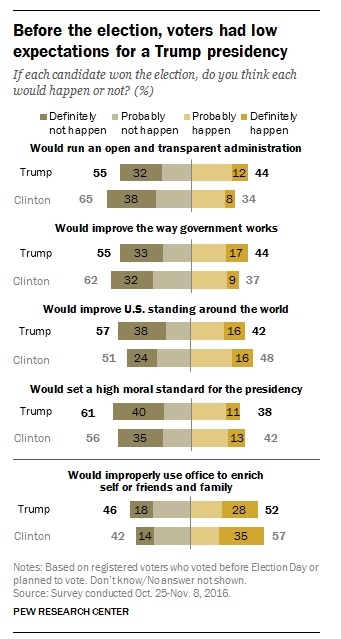Most Voters Expect Trump to be a Terrible President, But Thought Clinton Would Have Been Worse
Guys, this is bleak. We can't keep doing this to ourselves.

New polling data collected over the final two weeks of the presidential campaign paints the picture of a weary, pessimistic electorate and makes a strong case for de-escalating the power of the presidency.
The Pew Research Center surveyed more than 3,700 voters (respondents had either voted already or said they planned to vote) between October 25 and November 8 to take the pulse of the electorate on a wide range of issues. There's lots of interesting data in the survey, including details on which issues were most salient to Trump and Clinton voters as the two candidates made their closing arguments. Trump scored highest, no surprise, with voters worried about terrorism and illegal immigration while Clinton had her biggest edge with those worried about climate change and gun violence.
The most interesting part of the survey is a series of five questions where voters were asked to imagine a hypothetical Trump administration and a hypothetical Clinton one.
For each candidate, voters were asked about five things: would they run an open and transparent administration, would they improve how government works, would they improve the United State's standing in the world, would they set a high moral standard for the presidency and would they use the office of the presidency to personally enrich themselves and their friends.
Trump got negative marks across the board. He scored "best" on the questions about running a transparent administration (the bar is particularly low on that point) and for improving how the government works. In both cases, 44 percent of voters said he would probably or definitely do those things. He scored worse on the "high moral standard" question, with only 38 percent of voters saying they believed he would achieve that.
As bad as Trump's numbers were, it's telling that Clinton scored worse on three of the five metrics. Only 34 percent of voters said they believed she would be open and transparent, only 37 percent said they thought a Clinton administration would improve how government works, and 57 percent of voters said they thought she would improperly use the office to enrich herself and friends (a majority, 52 percent, said they thought Trump would do that too).
From a political science perspective, the Pew survey helps explain why undecided voters broke towards Trump as the lesser-of-two-evils and why Clinton had such a difficult time dealing with questions of trustworthiness throughout the campaign.
More generally, guys, this is really bleak. The country just picked a new commander-in-chief who 57 percent of voters say is unlikely to improve the country's standing in the world and better than half say he will use the White House to enrich himself. Simple math says that at least some of those people voted for Trump, despite those misgivings, because Clinton was worse.
Neither major party produced anything remotely resembling an acceptable, electable presidential nominee this year. That's not news (we've been saying it for months), but when voters are this pessimistic about the choice they are being given, it makes you wonder why they aren't demanding more, better choices.
It also makes you think that vesting so much power in the hands of one man (or woman)—a man we collectively view as bad news—isn't a good idea.


Show Comments (281)